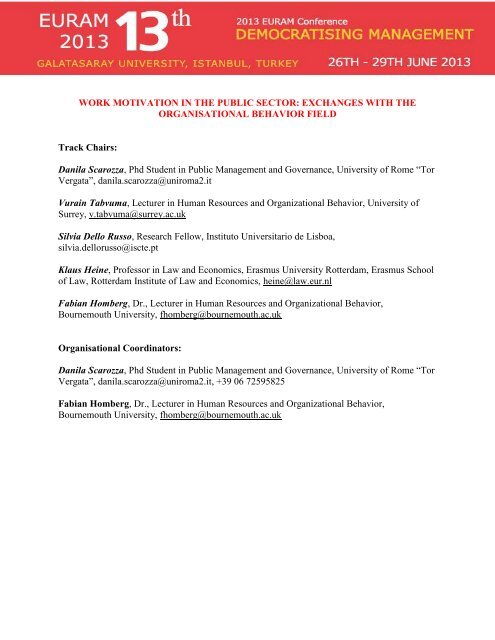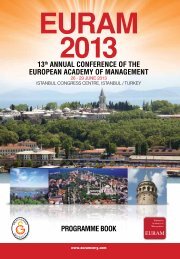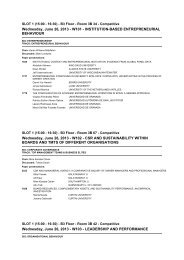WORK MOTIVATION IN THE PUBLIC SECTOR: EXCHANGES WITH ...
WORK MOTIVATION IN THE PUBLIC SECTOR: EXCHANGES WITH ...
WORK MOTIVATION IN THE PUBLIC SECTOR: EXCHANGES WITH ...
Create successful ePaper yourself
Turn your PDF publications into a flip-book with our unique Google optimized e-Paper software.
<strong>WORK</strong> <strong>MOTIVATION</strong> <strong>IN</strong> <strong>THE</strong> <strong>PUBLIC</strong> <strong>SECTOR</strong>: <strong>EXCHANGES</strong> <strong>WITH</strong> <strong>THE</strong><br />
ORGANISATIONAL BEHAVIOR FIELD<br />
Track Chairs:<br />
Danila Scarozza, Phd Student in Public Management and Governance, University of Rome “Tor<br />
Vergata”, danila.scarozza@uniroma2.it<br />
Vurain Tabvuma, Lecturer in Human Resources and Organizational Behavior, University of<br />
Surrey, v.tabvuma@surrey.ac.uk<br />
Silvia Dello Russo, Research Fellow, Instituto Universitario de Lisboa,<br />
silvia.dellorusso@iscte.pt<br />
Klaus Heine, Professor in Law and Economics, Erasmus University Rotterdam, Erasmus School<br />
of Law, Rotterdam Institute of Law and Economics, heine@law.eur.nl<br />
Fabian Homberg, Dr., Lecturer in Human Resources and Organizational Behavior,<br />
Bournemouth University, fhomberg@bournemouth.ac.uk<br />
Organisational Coordinators:<br />
Danila Scarozza, Phd Student in Public Management and Governance, University of Rome “Tor<br />
Vergata”, danila.scarozza@uniroma2.it, +39 06 72595825<br />
Fabian Homberg, Dr., Lecturer in Human Resources and Organizational Behavior,<br />
Bournemouth University, fhomberg@bournemouth.ac.uk
Abstract:<br />
The topic of work motivation in the private sector has been largely studied, whereas the literature<br />
on motivation in the public sector has been often criticised to be theoretically and empirically<br />
less developed. Nevertheless, Public Service Motivation (PSM), is a construct proposed<br />
specifically in the field of public organizations’ studies, and is defined as "an individual's<br />
predisposition to respond to motives grounded primarily or uniquely in public institutions and<br />
organizations" (Perry, Wise, 1990, p. 368). A great deal of research has been dedicated to PSM<br />
and to how this is connected to different aspects of employee performance in government jobs.<br />
The basic assumption for PSM is that doing a job that is helpful to others is in itself rewarding. If<br />
this assumption holds, then, the argument is that public service jobs are more likely to be sought<br />
and better performed by people who are moved primarily by PSM, rather than by “rational<br />
choice” type of material pursuits. The attention of this track is addressed to both individual<br />
characteristics and structural, institutional and organisational factors that help understand in what<br />
context – where, when and how – PSM finds a favourable ground to its recognition and<br />
development, and its presence can actually “make a difference”.<br />
Meanwhile, the track also aims to contribute to making a connection between PSM and other<br />
motivational constructs, as well as to broaden the scope of investigation of work motivation in<br />
the public sector by relying on more recent approaches in the OB field and by deepening the role<br />
not only of dispositional but also contextual variables. Additionally, the study of incentive<br />
regimes is of interest to a wide range of audiences including but not restricted to scholars in the<br />
fields of management, economics, law, psychology and public administration.<br />
The track welcomes papers from scholars eager to contribute to the development of an<br />
interdisciplinary research agenda to investigate work motivation into public organizations in<br />
different social, cultural, political and economic contexts.





